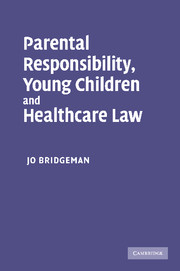Book contents
- Frontmatter
- Contents
- Acknowledgements
- Table of cases
- Table of legislation and international instruments
- 1 Parents, young children and healthcare law
- 2 Child-centred healthcare services for children
- 3 Child health and parental obligations
- 4 In the best interests of the child?
- 5 The quality of life of severely disabled children
- 6 Obligations and caring responsibilities
- 7 Relational responsibilities
- Bibliography
- Index
6 - Obligations and caring responsibilities
Published online by Cambridge University Press: 17 July 2009
- Frontmatter
- Contents
- Acknowledgements
- Table of cases
- Table of legislation and international instruments
- 1 Parents, young children and healthcare law
- 2 Child-centred healthcare services for children
- 3 Child health and parental obligations
- 4 In the best interests of the child?
- 5 The quality of life of severely disabled children
- 6 Obligations and caring responsibilities
- 7 Relational responsibilities
- Bibliography
- Index
Summary
Introduction
The previous three chapters have considered decision-making responsibility in relation to the health and well-being of children. It has been argued that healthcare decisions should be approached through a conceptual framework of relational responsibilities. The responsibilities of both parent and healthcare professional arise out of their relationship with the child, are determined both by social expectation and by individual interpretation but, importantly, differ depending upon the needs of the child. A central element of the relationships between professionals, parents and the child is dependency, the nature of which differs. Sick or injured children, children with complex needs and children with disabilities are dependent upon their parents to meet their needs according to their age, state of health or impairments. They also depend upon healthcare professionals to work together in a team with the child's parents to meet their health needs. Parents, primarily responsible for and emotionally attached to their child, depend upon healthcare professionals to take care of their child, using their skills and expertise. The vulnerability that this reliance brings is clearly apparent in the evidence given by parents to the Bristol Royal Infirmary Inquiry where parents articulated their feelings of being let down by professionals to whom they had entrusted the care of their child, which meant that they felt that they, in turn, had let down their child. This web of dependency, reliance and trust is not acknowledged by laws premised upon selfish individualism.
- Type
- Chapter
- Information
- Parental Responsibility, Young Children and Healthcare Law , pp. 196 - 227Publisher: Cambridge University PressPrint publication year: 2007



